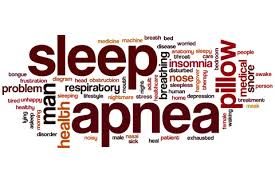- Home
- Editorial
- News
- Practice Guidelines
- Anesthesiology Guidelines
- Cancer Guidelines
- Cardiac Sciences Guidelines
- Critical Care Guidelines
- Dentistry Guidelines
- Dermatology Guidelines
- Diabetes and Endo Guidelines
- Diagnostics Guidelines
- ENT Guidelines
- Featured Practice Guidelines
- Gastroenterology Guidelines
- Geriatrics Guidelines
- Medicine Guidelines
- Nephrology Guidelines
- Neurosciences Guidelines
- Obs and Gynae Guidelines
- Ophthalmology Guidelines
- Orthopaedics Guidelines
- Paediatrics Guidelines
- Psychiatry Guidelines
- Pulmonology Guidelines
- Radiology Guidelines
- Surgery Guidelines
- Urology Guidelines
Sleep apnea may affect semantic memory and lead to depression

The new study led by RMIT University in Melbourne, Australia, examined how the condition affected autobiographical memory and found people with untreated OSA had problems recalling specific details about their lives.
According to an estimate, more than 936 million people worldwide suffer from obstructive sleep apnea (OSA). People with OSA are known to suffer memory problems and also have higher rates of depression but it is not well understood how these issues are connected with the development of the disease.
Lead investigator Dr Melinda Jackson said"We know that overly general autobiographical memories -- where people don't remember many specific details of life events -- are associated with the development of persistent depression," Jackson said."Our study suggests sleep apnea may impair the brain's capacity to either encode or consolidate certain types of life memories, which makes it hard for people to recall details from the past.
The study compared 44 adults with untreated OSA to 44 healthy controls, assessing their recall of different types of autobiographical memories from their childhood, early adult life and recent life.
The results showed people with OSA had significantly more over general memories -- 52.3% compared with 18.9% of the control group.
The study also looked at the recall of semantic memory (facts and concepts from your personal history, like the names of your school teachers) and episodic memory (events or episodes, like your first day of high school).
While people with OSA struggled with semantic memory, their episodic memory was preserved. This is likely related to their fragmented sleeping patterns, as research has shown that good sleep is essential for the consolidation of semantic autobiographical memory.
Across both groups, being older was associated with having a higher number of over general autobiographical memories while higher depression was linked to having worse semantic memory.
Jackson, a Vice-Chancellor's Senior Research Fellow in RMIT's School of Biomedical and Health Sciences, said the results showed the need for further studies to better understand the role of untreated OSA on memory processing.
"Brain scans of people with sleep apnea show they have a significant loss of grey matter from regions that overlap with the autobiographic memory network," she said.
"We need to look at whether there's a shared neurobiological mechanism at work -- that is, does the dysfunction of that network lead to both depression and memory problems in people with sleep apnea?"
Jackson said the use of CPAP machines to treat OSA had been shown to improve some of the cognitive impairments related to the condition.
"An important next step will be to determine whether successful treatment of sleep apnea can also help counter some of these memory issues or even restore the memories that have been lost."
- Sleep apnoea occurs when the muscles in the upper airway collapse during sleep, blocking off the airway above the voice box.
- Breathing stops for a period of time (generally between 10 seconds and up to 1 minute) until the brain registers the lack of breathing or a drop in oxygen levels and sends a small wake-up call. The sleeper rouses slightly, opens the upper airway, typically snorts and gasps, then drifts back to sleep almost immediately. This pattern can repeat itself hundreds of times a night, causing fragmented sleep.
- Around one in four men over the age of 30 years have some degree of sleep apnoea, making it more common than asthma.
- Conservative treatment includes weight loss and cutting back on alcohol.
- Active treatment includes nasal CPAP, mouthguards or surgical correction of upper airway obstruction.
- Daytime sleepiness may distinguish simple snorers from people with sleep apnoea.

Disclaimer: This site is primarily intended for healthcare professionals. Any content/information on this website does not replace the advice of medical and/or health professionals and should not be construed as medical/diagnostic advice/endorsement or prescription. Use of this site is subject to our terms of use, privacy policy, advertisement policy. © 2020 Minerva Medical Treatment Pvt Ltd